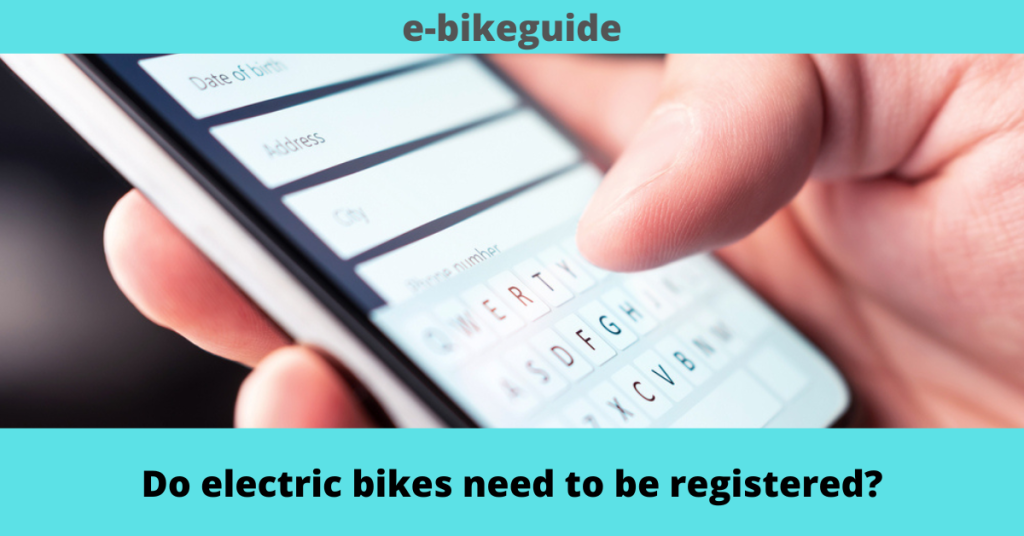Do you have to register an electric bike? The answer, unfortunately, isn’t a simple yes or no. The legal landscape surrounding e-bikes is complex, varying significantly from one country or region to another. While some places treat them like traditional bicycles, others classify them closer to motorcycles, imposing stricter regulations.
Navigating this regulatory maze can be challenging, especially for those eager to embrace the eco-friendly and convenient mode of transportation that electric bikes offer. This guide aims to shed light on the key factors influencing registration requirements for electric bikes, exploring the processes, benefits, and potential consequences of non-compliance.
Legal Requirements for Electric Bikes

Electric bikes, also known as e-bikes, are gaining popularity worldwide as a sustainable and convenient mode of transportation. However, the legal requirements for electric bikes can vary significantly depending on the country or region. Understanding these regulations is crucial for e-bike owners and potential buyers to ensure they are operating their vehicles legally and safely.
Electric Bike Classifications
The legal classification of electric bikes is a key factor in determining the regulations that apply to them. Different countries and regions have adopted various classifications based on factors such as motor power, maximum speed, and pedal assist.
- Class 1: These e-bikes are equipped with a motor that assists pedaling up to a certain speed, typically 20 km/h (12 mph) or 25 km/h (15 mph). They do not have a throttle and rely on the rider’s pedaling for propulsion. In many countries, Class 1 e-bikes are treated as regular bicycles and do not require registration or licensing.
- Class 2: Class 2 e-bikes have a throttle that allows the rider to accelerate without pedaling. They typically have a maximum speed limit of 32 km/h (20 mph) or 25 km/h (15 mph) and are often subject to different regulations than Class 1 e-bikes.
- Class 3: Class 3 e-bikes are similar to Class 2 but have a higher speed limit, typically 45 km/h (28 mph) or 32 km/h (20 mph). These e-bikes may require registration and licensing, similar to motorcycles.
Registration and Licensing
The requirements for registration and licensing of electric bikes vary greatly across different jurisdictions. In some countries, Class 1 e-bikes may not require registration, while Class 2 and 3 e-bikes may need to be registered and licensed. For example, in the United States, federal law does not require e-bikes to be registered, but individual states may have their own regulations.
In Europe, some countries require registration for all e-bikes, regardless of their class.
Insurance
Insurance requirements for electric bikes can also differ depending on the country or region. In some areas, e-bikes may be covered under existing bicycle insurance policies. However, in other places, separate insurance policies may be required for e-bikes, particularly for Class 2 and 3 e-bikes.
Comparison with Traditional Bicycles and Motorcycles
Electric bikes are often considered a hybrid between traditional bicycles and motorcycles, and their legal requirements reflect this. Class 1 e-bikes are generally treated as regular bicycles and do not require registration or licensing. Class 2 and 3 e-bikes, however, may require registration and licensing similar to motorcycles, depending on their speed and motor power.
In many countries, e-bikes are subject to similar regulations as traditional bicycles, but the specific requirements can vary based on the e-bike’s classification and the local laws.
Registration Processes
The process of registering an electric bike varies significantly depending on the jurisdiction and the type of electric bike you own. Some states require registration, while others do not. The registration process typically involves providing documentation, paying a fee, and obtaining a registration sticker or plate.
Registration Requirements
The specific requirements for registering an electric bike can vary depending on the state or local jurisdiction. However, common requirements include:
- Proof of Ownership: This may include a bill of sale, title, or other documentation that verifies your ownership of the electric bike.
- Electric Bike Identification Number (VIN): The VIN is a unique identifier that is assigned to each electric bike during manufacturing. This number can be found on the frame of the bike.
- Proof of Insurance: Some jurisdictions may require you to have insurance for your electric bike, particularly if it is classified as a motorized vehicle.
- Payment of Registration Fees: Registration fees can vary depending on the jurisdiction and the type of electric bike. Some jurisdictions may offer discounts for electric bikes, particularly those that are classified as Class 1 or 2.
Registration Process Examples
Here are examples of the registration processes in some jurisdictions:
California
In California, electric bikes are classified as bicycles and do not require registration. However, riders must follow the same traffic laws as bicyclists.
New York
In New York, electric bikes are classified as bicycles and do not require registration. However, certain types of electric bikes, such as those with a top speed exceeding 20 mph, may be subject to registration requirements as motorcycles.
Florida
Florida does not require registration for electric bikes. However, electric bikes must be registered with the state if they are used for commercial purposes.
Registration Processes for Different Types of Electric Bikes
| Electric Bike Class | Registration Requirements |
|---|---|
| Class 1 | Generally do not require registration, as they are classified as bicycles. |
| Class 2 | Generally do not require registration, as they are classified as bicycles. |
| Class 3 | May require registration in some jurisdictions, depending on the specific regulations. |
Benefits of Registration: Do You Have To Register An Electric Bike

Registering your electric bike provides several advantages, enhancing your ownership experience and promoting safety. It serves as a vital step in safeguarding your investment and ensuring a secure and enjoyable ride.
Proof of Ownership and Insurance Coverage
Registration serves as legal proof of ownership, establishing your rightful claim to the electric bike. This documentation becomes crucial in various situations, such as:
- Disputes: If your electric bike is ever involved in an accident or stolen, registration documents provide irrefutable evidence of your ownership, preventing potential legal complications.
- Insurance Claims: Insurance companies require proof of ownership before processing any claims related to damage or theft. Registration documents simplify this process, facilitating a smoother and faster claim resolution.
- Resale Value: A registered electric bike often commands a higher resale value as potential buyers are reassured of its legal status and provenance.
Safety and Security, Do you have to register an electric bike
Registration plays a vital role in promoting safety and security on the roads. It helps:
- Identification: Registered electric bikes are easily identifiable through unique registration numbers, aiding law enforcement in tracking down stolen bikes or identifying culprits in accidents.
- Enforcement: Registration facilitates enforcement of traffic laws and regulations specifically designed for electric bikes, promoting safe and responsible riding practices.
- Emergency Response: In case of an accident or emergency, registered electric bikes can be quickly identified, allowing emergency responders to provide timely and effective assistance.
Theft Prevention and Recovery
Registration significantly contributes to theft prevention and recovery by:
- Deterrent: The presence of a registration number acts as a deterrent to potential thieves, as it increases the risk of being caught and identified.
- Tracking: Registered electric bikes can be tracked and located more effectively, increasing the chances of recovery in case of theft. Many jurisdictions have databases that store registration information, aiding in the identification and retrieval of stolen bikes.
- Community Awareness: Registration encourages community awareness and vigilance regarding electric bike theft. Residents can report suspicious activity involving unregistered or unidentified bikes, contributing to a safer environment for electric bike owners.
Exemptions and Exceptions
Not all electric bikes require registration. Certain categories are exempt from registration requirements, depending on factors such as the bike’s power output, speed capabilities, and intended use.
Understanding these exemptions is crucial for electric bike owners, as it can save them time, effort, and potential costs associated with registration. This section will delve into specific instances where electric bike registration may not be required and clarify the criteria for exemption.
Electric Bikes Classified as Bicycles
Electric bikes that meet specific criteria are often classified as bicycles and exempt from registration requirements.
This exemption typically applies to electric bikes with a power output below a certain threshold, usually around 750 watts, and a maximum speed limit of 20 mph (32 km/h). These bikes are often referred to as Class 1 or Class 2 e-bikes.
For example, an electric bike with a 250-watt motor and a maximum speed of 20 mph, used for commuting or recreational purposes, may not require registration in many jurisdictions.
Electric Bikes Used Exclusively on Private Property
Electric bikes used solely on private property, such as within a gated community or on a private ranch, may not require registration.
This exemption is based on the principle that registration is primarily intended for vehicles operating on public roads.
Electric Bikes Used for Specific Purposes
Electric bikes used for specific purposes, such as law enforcement or emergency response, may be exempt from registration.
These exemptions are often granted based on the unique nature of the bike’s use and the need for immediate deployment in emergency situations.
Electric Bikes with Limited Range
Electric bikes with limited range, often referred to as “pedal-assist” bikes, may be exempt from registration.
These bikes rely heavily on the rider’s pedaling effort and have limited battery capacity, which may not meet the criteria for registration in some jurisdictions.
Electric Bikes with Specialized Designs
Electric bikes with specialized designs, such as those used for adaptive cycling, may be exempt from registration.
These bikes are often customized for individuals with disabilities and may not meet the standard definition of a motorized vehicle.
Flowchart for Determining Registration Requirements
The decision-making process for determining electric bike registration requirements can be illustrated using a flowchart:
Start → Is the electric bike used on public roads? → Yes → Does the electric bike exceed the power output or speed limit for classification as a bicycle? → Yes → Registration required → End.
Start → Is the electric bike used on public roads? → Yes → Does the electric bike exceed the power output or speed limit for classification as a bicycle? → No → Registration not required → End.
Start → Is the electric bike used on public roads? → No → Registration not required → End.
Consequences of Non-Registration

Operating an unregistered electric bike can have serious consequences, including fines, legal penalties, and even the confiscation of your vehicle. It’s crucial to understand the legal implications of non-compliance and ensure your electric bike is registered as required by your local jurisdiction.
Penalties and Fines
The penalties for operating an unregistered electric bike vary depending on the jurisdiction. In some areas, you might receive a warning, while in others, you could face hefty fines and even legal action. Here’s a breakdown of potential penalties:
- Fines: These can range from a few hundred dollars to several thousand dollars, depending on the severity of the offense and the jurisdiction.
- Court Costs: If you are found guilty of operating an unregistered electric bike, you may be required to pay court costs in addition to fines.
- Vehicle Confiscation: In some cases, the authorities may confiscate your electric bike if it is found to be unregistered. This can be a significant financial loss, as you may not be able to recover your vehicle or its value.
Legal Ramifications of Non-Compliance
Non-compliance with registration regulations can lead to a variety of legal consequences. These can include:
- Criminal Charges: In some jurisdictions, operating an unregistered electric bike can be considered a criminal offense, leading to charges and potential jail time.
- Insurance Complications: If you are involved in an accident while operating an unregistered electric bike, your insurance company may refuse to cover the damages, leaving you financially liable.
- Civil Liability: In case of an accident, you could be held personally liable for any damages or injuries caused, even if you were not at fault.
Severity of Consequences in Different Jurisdictions
The severity of consequences for non-registration can vary significantly depending on the jurisdiction. Here’s a table showcasing examples of potential penalties in different regions:
| Jurisdiction | Fine | Other Penalties |
|---|---|---|
| City A | $200-$500 | Warning, vehicle confiscation |
| State B | $500-$1000 | Court costs, license suspension |
| Country C | $1000-$5000 | Jail time, vehicle confiscation |
It’s essential to note that these are just examples, and actual penalties can vary depending on the specific circumstances of the case. It’s always advisable to check with your local authorities for accurate and up-to-date information on registration requirements and penalties.
Resources and Information
Finding accurate and up-to-date information on electric bike registration requirements can be crucial for ensuring compliance and avoiding penalties. This section will guide you to reliable sources and government agencies that can provide the necessary details.
Official Websites and Government Agencies
Official government websites are the most reliable sources for information on electric bike regulations. These websites provide clear and concise details on registration requirements, legal definitions, and any specific rules or exemptions that may apply.
- United States: The National Highway Traffic Safety Administration (NHTSA) website provides comprehensive information on electric bike regulations and safety standards in the US. https://www.nhtsa.gov/
- Canada: Transport Canada’s website offers information on electric bike regulations, including registration requirements and safety standards. https://www.tc.gc.ca/
- United Kingdom: The UK government’s website provides details on electric bike regulations, including registration requirements and safety standards. https://www.gov.uk/
- Australia: The Australian government’s website provides information on electric bike regulations, including registration requirements and safety standards. https://www.gov.au/
Country/Region-Specific Resources
For specific information on electric bike registration in your country or region, it’s essential to consult local government websites and transportation authorities. These resources will provide the most up-to-date information on regulations, registration processes, and any applicable exemptions.
- European Union: The European Union has a comprehensive website dedicated to electric bike regulations and safety standards. https://ec.europa.eu/
- Japan: The Ministry of Land, Infrastructure, Transport and Tourism (MLIT) provides detailed information on electric bike regulations in Japan. https://www.mlit.go.jp/en/
- China: The Ministry of Transport of the People’s Republic of China provides information on electric bike regulations and standards in China. https://www.mot.gov.cn/
Ultimately, the decision of whether or not to register your electric bike rests on a careful assessment of local regulations and your individual needs. Understanding the legal framework and weighing the advantages and disadvantages of registration can empower you to make an informed choice that ensures a safe and enjoyable experience on the road.
Helpful Answers
What happens if I don’t register my electric bike?
Failing to register your electric bike where required can result in fines, penalties, or even the confiscation of your bike. The severity of consequences varies by jurisdiction.
Can I register my electric bike online?
The registration process often involves online applications, but some jurisdictions may require in-person visits for documentation verification.
How long does it take to register an electric bike?
The processing time for electric bike registration varies depending on the jurisdiction. It can take anywhere from a few days to several weeks.
Is there a specific type of insurance needed for electric bikes?
While some jurisdictions may require insurance for electric bikes, the specific type and coverage can vary. It’s essential to consult with your local insurance provider for guidance.